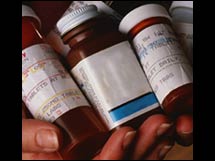Novartis poised to lead pharma packThe Swiss drug giant has huge growth potential in 2007, as do Schering and Lilly.NEW YORK (CNNMoney.com) -- Novartis could be the hottest drug giant in 2007, analysts say, with Schering-Plough and Eli Lilly & Co. not far behind. "Novartis is my top pick," said Joe Tooley, analyst for A.G. Edwards, who lauded the potential blockbusters in the Swiss drugmaker's pipeline. The analyst expects the company to bring seven new products onto the market in 2007.  Both Tooley and Miller Tabak analyst Les Funtleyder are optimistic about the earning potential of two experimental drugs from Novartis (Charts) -- Galvus, for diabetes, and Tekturna, for blood pressure. Both of these potential products have been filed with the Food and Drug Administration and are awaiting a decision. "Novartis' key is to get those two blockbusters, Tekturna and Galvus, on the market," said Les Funtleyder. He added that Tekturna sales could peak at about $1 billion in 2011 or 2012, and that his sales projections for Galvus exceed $1 billion. Tooley projected that annual Galvus sales could reach $1.7 billion by 2011 and Tekturna sales could reach nearly $1 billion. Galvus is similar in many respects to Merck's (up $0.42 to $44.02, Charts) recently-approved Januvia. Both drugs have potential as a once-a-day pill that will lower blood-sugar level in diabetics and help them manage their weight. Tooley also pointed out that Novartis doesn't have any major patent expirations looming in its near future, which sets this company apart from many other Big Pharma outfits. Pfizer (up $0.37 to $26.27, Charts), the world's biggest drug company, and Merck, the fourth-largest in America, are both scrambling to cut costs and build up their pipelines in the wake of their patent losses this year on key blockbusters, including Pfizer's antidepressant Zoloft and Merck's cholesterol-cutter Zocor. "[Novartis'] patent exposure has nothing significant that they're going to lose between now and 2011," said Tooley. Novartis could see its stock price climb more than 14 percent over the next 12 months, to $66 a share from its Dec. 28 close of $57.73, according to consensus provided by Thomson Financial. And the drug company's 2007 earnings per share are expected to climb 13 percent to $3.47. Schering-Plough and Lilly have also won bullish projections from a consensus of analysts. Schering-Plough's (down $0.14 to $23.50, Charts) stock price is projected to rise nearly 5 percent over the next 12 months, to $25 a share from its current level of $23.86, according to Thomson Financial consensus. In addition, the Kenilworth, N.J.-based drugmaker could see its earnings per share surge 26 percent to $1.04 in 2007. Schering-Plough was once considered a troubled company, largely because of the 2002 loss of its patent on the $3 billion-a-year allergy blockbuster Claritin. Sales typically plunge after the patent on a drug expires, but thanks to Schering's creative patent spin-offs of Claritin as an over-the-counter drug, the company managed to protect some of its sales. More recently, in August of 2006, Schering-Plough put to rest an investigation over its sales and marketing practices by the Department of Justice and the U.S. Attorney's Office for the District of Massachusetts, agreeing to a $435 million settlement. Now, Schering-Plough is seen by analysts as a diamond in the rough, with a future driven by the cholesterol-lowering blockbuster Vytorin. This drug, a combination of Schering-Plough's Zetia and Merck's Zocor, totaled $1.4 billion in sales during the first nine months of 2006. That's in addition to the separate total of $1.4 billion in Zetia sales from the same period. Lilly (up $0.11 to $52.21, Charts) won't face major patent losses until the patent on Zyprexa, an anti-psychotic with $3.2 billion in sales for the first nine months of 2006, expires in 2011, said Tooley of A.G. Edwards. The analyst said that future growth for Lilly will be driven by its pipeline, and by Lilly's plan to move 15 drug candidates per year into clinical trials. Lilly is currently awaiting an FDA decision on Arxxant, a potential treatment for diabetic retinopathy. The company's next potential product is Prasugrel, an experimental blood thinner that is in late-stage testing, which Lilly plans to file to the FDA towards the end of 2007, assuming that the tests are successful. A.G. Edwards' Tooley projects that annual Prasugrel sales will exceed $800 million by 2011. Thomson consensus sees Lilly as a growth story, projecting its stock price to climb more than 15 percent over the next 12 months to $60 per share from its Dec. 28 close of $52.01. Also according to consensus, the Indianapolis-based drugmaker could see its earnings per share rise 6 percent to $3.30 in 2007. But Miller Tabak's Funtleyder is more skeptical about Lilly's story, since Arxxant and Prasugrel "have run into speed bumps on the regulatory process." Funtleyder said that Arxxant was originally designed for multiple indications but that these have been whittled away during the development process, down to one. He added that Prasugrel's review process has been slow. And assuming that Prasugrel gets a green light from the FDA, Funtleyder said the drug will face fierce competition from Plavix, the blood thinner from Sanofi-Aventis and Bristol-Myers Squibb (up $0.36 to $26.40, Charts) that totaled $2.8 billion in sales during the first nine months of 2006. The analysts interviewed for this story do not own stock in the companies they discussed and their firms do not conduct business with them. Big Pharma's drug wish list for 2007 Novartis vs. Merck over diabetes |
|
